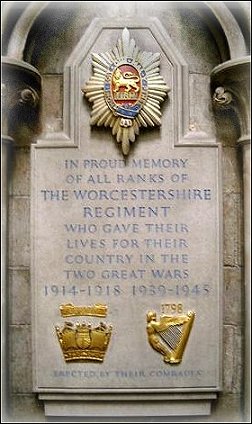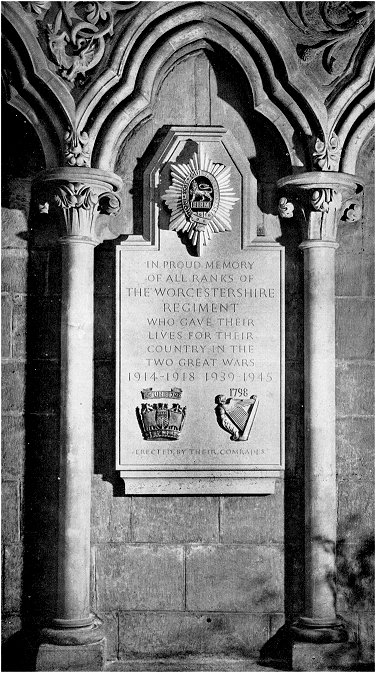Worcester Cathedral - Worcestershire Regiment War Memorial
On the 15th April 1950 was the day that the Worcestershire Regiment received the "Freedom of Entry" to the City of Worcester and were also presented with four Silver Drums. This event took place on the County Cricket Ground. In his speech the Major reviewed the 250 years of the Regiment's service, with its hard won battle honours, and finished by quoting General Sir Ivor Thomas's words about the 1st Battalion in North West Europe, during 1944-45: "The Battalion never had a failure. If dour, dogged fighting either in attack or defence came our way; if suden counterattaks came in from all directions, it always seemed to be the 1st Battalion Worcestershire Regiment who caught the brunt. Yet, with the Battalion in the thick of it, and on more than one occasion reported being surrounded, neither myself nor anyone else ever worried or had the slightest fears as to what the results would be. This is a tribute I am proud to pay as I was to have the Battalion under my command." This was followed by the Town Clerk reading the "Deed of Grant" which was presented to the Colonel, Brigadier B. C. S. Clarke, by the Lord Mayor of Worcester, who then also present the Silver Drums. The parade then marched off the Cricket Ground with the 'bands playing, bayonets fixed and colours flying' to the Cathedral through the streets of the City of Worcester. During service in the Cathedral, the Colonel of the Regiment unveiled a new War Memorial commorating the Worcestershire Regiment men who gave their lives in the two Great Wars of 1914-18 and 1939-45.
ADDRESS OF BRIGADIER B. C. S. CLARKE, D.S.O., COLONEL OF THE REGIMENT, |
 |
This Memorial, which, as Colonel of the Regiment, it is my honour to unveil in the Chapel of St. George, is erected by their Comrades to the lasting memory of all those soldiers of The Worcestershire Regiment who made the supreme sacrifice whilst fighting for our beloved Country and the freedom of mankind during the two Great World Wars.
Time does not permit me to go into details regarding the innumerable actions in which Battalions of our Regiment took an active part. We know they fought with distinction and even special mention. Let me simply refresh your memories by giving you a few general facts and figures. In the first Great War 1914-1918, we had twelve fighting Battalions engaged on various fronts. These Battalions teak an active part in no fewer than eighty-one heavy engagements for which Battle Honours were awarded for the campaigns in France and Flanders, Gallipoli, Macedonia, Italy, Mesopotamia and Persia. There were also numerous other engagements on all fronts, in which the various Battalions took part, but for which there were no Battle Honours. The casualties suffered by the Regiment were extremely heavy. No fewer than 505 Officers and 9,463 Other Ranks were killed or died of wounds received in action.
In the second Great War 1939-1945, we had four fighting Battalions engaged. These Battalions fought in North-West Europe, North Africa and Burma. The Battle Honours for this war have not yet been awarded. When they are we shall find that once again the Regiment has given a very good account of itself and will have earned a fair share.
The casualties suffered by the Regiment in this second Great War were, I am thankful to say, not so heavy, due to modern methods and greater support by other arms. However, no fewer than 74 Officers and 845 Other Ranks were killed or died of wounds. Thus we see that the total losses in killed or died of wounds received in action suffered by the Regiment in the two World Wars amounted to 579 Officers and 10,308 Other Ranks. Those are the men in memory of whom this Memorial has been erected.
May I suggest that, when we visit such memorials, which, of course, are to the Fallen, we also give a thought for those thousands of other men who, though they were not called upon to make the supreme sacrifice, suffered grievous bodily harm, many of them crippled for life or blinded.
Some of these men, I am glad to say, are able to be with us to-day—here in this very beautiful Cathedral to pay homage to their former fallen comrades. I like to think that they, too, are not forgotten.
I will now proceed to the unveiling of this Memorial to the Fallen.
The words inscribed thereon are these:
"In proud memory of all ranks of The Worcestershire Regiment Who gave their lives for their Country in the Two Great Wars 1914-1918 and 1939-1945
(Erected by their Comrades).
Lastly let me quote those famous words inscribed above the Menin Gate at Ypres:
"They shall grow not old, as we that are left grow old:
Age shall not weary them, nor the years condemn.
At the going down of the sun and in the morning
We will remember them."
Worcestershire Regiment Memorial |
ADDRESS OF THE DEAN OF WORCESTER AT THE UNVEILING AND DEDICATION OF THE REGIMENTAL WAR MEMORIAL Most fittingly in the after-glow of Easter and among the lovely sacrament of Spring we once again open wide the gates of memory, and review a great host of shining ones. In the presence of the Lord of life, who never fails to fulfil His promises of life, we salute our dead. With proud sorrow we recall those missing generations whose loss has impoverished the bloodstream of our race as their loyalty has enriched its immortal splendour. They went down into two great Valleys of Decision. Thanks to God and to their gallantry, those valleys were exalted into Hills of Deliverance for us. But, for them, they became Valleys of the Shadow of Death. They did not return. They went on. They kept faith with their country that their country might keep faith among the nations. They stood fast for the things which stand first. They gave all for issues that reach beyond our poor mortality. And to-day we pay high honour to men who did not seek honour for themselves, to men whose courage conquered fear, whose comradeship shone out of the darkness like a star, whose constancy accomplished our costly deliverance. There are insinuating voices of disillusionment and disparagement that would have us believe that their valour was in vain and their death a senseless sacrifice. Was it nothing that they and their living comrades here to-day saved us from the blight of oppression and the iron hand of tyranny? Was it no thanks to them that we have any freedom to enjoy and, if need be, to defend again? and those who fell tasted the bitterness of death that we might breathe the sweet breath of liberty and walk in the delectable light of life. The noble dream for which the noblest of them died was the dream of a better Britain and of a warless world. That dream may be dimmed, but it will not die. This at least is certain; nothing can dim or diminish the glory of their supreme self-offering. I prefer to think that this memorial stone, with many others, will go to the building of the Universal Temple of Peace, founded on international righteousness and goodwill, which in God's time will be built on earth. And because remembrance without resolve is but a fragile and fugitive thing, mere gust of sentiment or gush of emotion, our warrior dead, with their mighty claim on us, call us to keep unblackened the torch they handed on, to carry into the tasks of peace their spirit of fortitude and fellowship, single-mindedness and self-giving. |
And the dedication of this memorial will take us a. long way if it leads us to dedicate ourselves to God, to put ourselves under pledge to carry His high ways of living into all the by-ways of life. That is the best kind of memorial service. That is our truest tribute of honour to those whose faces we see no more, but whose love is with us for ever.

